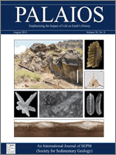
PALAIOS
metrics 2024
Exploring the Depths of Earth's History
Introduction
PALAIOS is a renowned journal published by the SEPM-Society for Sedimentary Geology, focusing on the interdisciplinary fields of paleontology and sedimentary geology. Established in 1986, this scholarly publication serves as a vital platform for disseminating innovative research and insightful reviews that bridge ecological and evolutionary aspects with paleontological studies. With an impressive track record, the journal has achieved a commendable impact factor and consistently holds a Q2 ranking in both Ecology, Evolution, Behavior and Systematics and Paleontology as of 2023. Researchers and professionals will benefit from the diverse range of studies presented, which encompass fossil analysis, stratigraphy, and the impacts of climate change on past ecosystems. By being at the forefront of research and education in these fields, PALAIOS not only enhances comprehension of historical biodiversity patterns but also informs contemporary ecological theories.
Metrics 2024
 0.62
0.62 1.50
1.50 1.70
1.70 86
86Metrics History
Rank 2024
Scopus
IF (Web Of Science)
JCI (Web Of Science)
Quartile History
Similar Journals
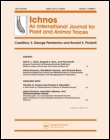
ICHNOS-AN INTERNATIONAL JOURNAL FOR PLANT AND ANIMAL TRACES
Capturing Nature's Legacy: The Art of Trace Fossil ResearchICHNOS: An International Journal for Plant and Animal Traces is a premier scholarly journal published by Taylor & Francis Inc, focusing on the intricate field of paleontology. With an ISSN of 1042-0940 and an E-ISSN of 1563-5236, this journal serves as a vital platform for the dissemination of high-quality research centered on the traces left by plants and animals throughout geological history. Established in 1990 and with a convergence period extending to 2024, ICHNOS holds a Q3 category ranking in Paleontology according to the 2023 quartiles, positioning it within the 48th percentile of its Scopus-rank peer group. Although it does not currently offer Open Access options, the journal remains a valuable resource for researchers and professionals seeking to deepen their understanding of trace fossils and their implications for paleoecological studies. By contributing critical insights into the evolutionary chronicle of life on Earth, ICHNOS plays an essential role in advancing the dialogue within the earth and planetary sciences community.

Swiss Journal of Palaeontology
Revealing the Mysteries of Earth's Prehistoric LifeSwiss Journal of Palaeontology, published by SPRINGER INT PUBL AG, stands as a leading platform for innovative research within the field of paleontology, contributing significantly to the understanding of Earth's historical life forms and their evolutionary pathways. With its ISSN 1664-2376 and E-ISSN 1664-2384, this journal has established a strong presence in academic circles, recognized as a Q1 journal in the category of Paleontology for 2023. Moreover, it ranks 20th out of 113 in the Earth and Planetary Sciences, securing an impressive 82nd percentile on Scopus, underscoring its influence and reach in the scientific community. The journal publishes cutting-edge research findings, theoretical advancements, and comprehensive reviews that span the globe, making it an essential resource for researchers, professionals, and students in the paleontological sciences. For those interested in contributing to and learning from the latest discoveries, the Swiss Journal of Palaeontology promises to be an invaluable addition to your academic library.

PALEONTOLOGICAL JOURNAL
Unearthing the Past, Shaping the Future.The PALEONTOLOGICAL JOURNAL, published by PLEIADES PUBLISHING INC, is a premier platform for the dissemination of research in the field of paleontology. With an ISSN of 0031-0301 and E-ISSN 1555-6174, this journal serves the academic community by providing insights into fossil studies, evolutionary biology, and the historical narrative of life on Earth. Despite being categorized in the Q3 quartile for 2023 and currently holding a Scopus rank of #84 out of 113 in the Earth and Planetary Sciences- Paleontology category, it remains a valuable resource for researchers and practitioners. The journal's coverage spans from 1990 to 2024, offering a comprehensive historical perspective while also addressing contemporary issues in paleological research. Scholars and students alike benefit from its rigorous peer-reviewed articles and the opportunity to access vital knowledge in the ever-evolving field of paleontology.

JOURNAL OF THE GEOLOGICAL SOCIETY OF INDIA
Pioneering research for a sustainable geological future.JOURNAL OF THE GEOLOGICAL SOCIETY OF INDIA, published by Springer India, serves as a pivotal platform for researchers and practitioners in the field of geology. Established in 1979, this journal has been instrumental in advancing geological research throughout India, showcasing both regional studies and cutting-edge global research. With its Category Quartile ranking of Q3 in the geology category for 2023, and a significant Scopus rank of 171 among 321 journals in Earth and Planetary Sciences, it remains a respected source of scholarly activity. The journal is dedicated to the dissemination of original research articles, reviews, and case studies that encapsulate the dynamic scope of geological science, thus contributing to the understanding of geological phenomena. Although currently not offering open access, the journal maintains a commitment to high-quality scholarship and aims to engage a diverse readership, enhancing the knowledge and practice of geology across various disciplines.
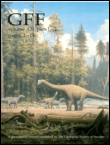
GFF
Elevating Research Standards in Geology and Paleontology.GFF is a prestigious academic journal dedicated to advancing research in the fields of Geology and Paleontology. Published by Taylor & Francis Ltd in the United Kingdom, GFF serves as a vital platform for disseminating innovative findings and fostering discussions among researchers, professionals, and students alike. With a noteworthy impact factor reflecting its significance in the scientific community, GFF has achieved Q2 ranking in both Geology and Paleontology, underscoring its commitment to high-quality scholarship. The journal has been operational since 1872, accumulating a rich history of contributing to our understanding of earth sciences. It currently ranks #133 out of 321 in Earth and Planetary Sciences - Geology, and #50 out of 113 in Paleontology according to Scopus rankings. Although it does not offer an open access option, GFF remains accessible through various academic databases, ensuring that cutting-edge research reaches a wide audience. Its comprehensive scope aims to explore critical advancements in geological and paleontological sciences, making it an essential resource for those committed to exploring the intricacies of our planet’s past and present.
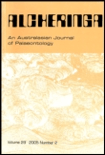
ALCHERINGA
Fostering Insights in Ecology, Evolution, and BeyondALCHERINGA, published by Taylor & Francis Ltd, is a distinguished academic journal that has been at the forefront of research in the fields of ecology, evolution, behavior, systematics, and paleontology since its inception in 1975. With an ISSN of 0311-5518 and E-ISSN 1752-0754, this journal serves as a critical platform for the dissemination of high-quality research, contributing significantly to the understanding of biological and geological sciences. Ranking in the Q3 quartile for both Ecology, Evolution, Behavior and Systematics, as well as Paleontology, ALCHERINGA is well-positioned within the academic community, attracting submissions from researchers across the globe. The journal's Scopus ranks further highlight its relevance, particularly its position in the 51st percentile for Ecology and the 50th percentile for Paleontology. Although it does not operate under an open access model, ALCHERINGA remains committed to providing valuable insights and fostering discussions that are essential for the advancement of these vital scientific disciplines. Researchers, professionals, and students are encouraged to explore the profound implications of the studies published within, making it an indispensable resource for anyone aiming to deepen their expertise in these fields.

REVISTA BRASILEIRA DE PALEONTOLOGIA
Connecting Scholars to the Rich Tapestry of Earth's HistoryREVISTA BRASILEIRA DE PALEONTOLOGIA (ISSN: 1519-7530, E-ISSN: 2236-1715) is a premier academic journal dedicated to the field of paleontology, published by the esteemed SOCIEDADE BRASILEIRA DE PALEONTOLOGIA. Operating under a Q3 quartile ranking in the 2023 Scopus statistics for Paleontology, this journal serves as a vital platform for researchers, professionals, and students to disseminate and engage with cutting-edge discoveries and methodologies in paleontological studies. With a broad scope that encompasses various aspects of Earth's historical life, REVISTA BRASILEIRA DE PALEONTOLOGIA provides an essential resource for the scientific community, particularly those based in Brazil and South America. The journal is committed to promoting rigorous research and fostering collaboration among scholars, ultimately contributing to advancements in the understanding of past biodiversity and extinction events. Its thoughtful curation of articles since 2010 ensures that it remains at the forefront of paleontological scholarship, despite its limited HIndex and open access options. This journal is a crucial asset for anyone looking to deepen their understanding of evolutionary processes that have shaped our planet.

PALAEONTOGRAPHICA ABTEILUNG A-PALAOZOOLOGIE-STRATIGRAPHIE
Unveiling Earth's Past: Where Paleontology Meets StratigraphyPalaeontographica Abteilung A-Palaozoologie-Stratigraphie is a prominent academic journal that serves as a vital resource for researchers in the fields of Paleontology and Stratigraphy. Published by E Schweizerbart'sche Verlagsbuchhandlung in Germany, this journal has been instrumental in disseminating cutting-edge research from 1996 to 2024. With an established reputation highlighted by its Q3 ranking in both Paleontology and Stratigraphy, it ranks 26th among 113 journals in Paleontology and 15th among 55 in Stratigraphy, showcasing its significance within the scientific community. Although it does not currently offer open access, the journal provides an invaluable platform for the exchange of innovative ideas and findings in paleobiological and stratigraphic studies. As such, Palaeontographica continues to attract contributions from leading academics, making it an indispensable publication for professionals and students alike who are eager to advance their understanding of Earth's historical biological and geological patterns.
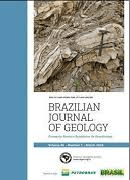
Brazilian Journal of Geology
Exploring the Depths of Earth ScienceBrazilian Journal of Geology, the flagship publication of the SOC BRASILEIRA GEOLOGIA, has been a beacon of geoscientific research since its inception in 2013. With an ISSN of 2317-4889 and an E-ISSN of 2317-4692, this open-access journal has facilitated the dissemination of high-quality research across various branches of geosciences, making it freely accessible to a global audience since 2014. Hailing from Brazil, the journal proudly holds a Q2 ranking in Earth and Planetary Sciences as of 2023, and ranks #73 out of 195 in Scopus, indicating its growing impact and relevance in the field. The Brazilian Journal of Geology aims to bridge diverse geological studies with interdisciplinary approaches, promoting the understanding and application of geology in addressing contemporary scientific challenges. As it converges research from 2013 to 2024, the journal not only enriches the academic landscape but also serves as a vital resource for researchers, professionals, and students eager to explore the complexities of the Earth and its processes.

RIVISTA ITALIANA DI PALEONTOLOGIA E STRATIGRAFIA
Advancing Knowledge in Geological SciencesRIVISTA ITALIANA DI PALEONTOLOGIA E STRATIGRAFIA, published by Università degli Studi di Milano, is a leading open access journal dedicated to the fields of Paleontology, Geology, and Stratigraphy. Established in 1979, this prestigious journal fosters the dissemination of high-quality research and innovative studies within these disciplines, holding a commendable Q2 ranking in Geology, Paleontology, and Stratigraphy as of 2023. The journal’s commitment to accessibility since 2016 underlines its objective to promote the sharing of knowledge among researchers, professionals, and students alike. With its notable Scopus rankings reflecting a solid performance in the Earth and Planetary Sciences, particularly in Paleontology and Stratigraphy, RIVISTA ITALIANA serves as a vital resource for those seeking to stay informed on the latest advancements and discoveries within the geological sciences. For further inquiries, the editorial office is located at C/O RIVISTA ITALIANA PALEONTOLOGIA STRATIGRAFIA, VIA MANGIAGALLI, 34, 20133 MILANO, ITALY.